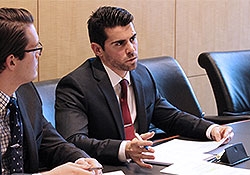Transactional Law Competition offers students experience at negotiating table

More than 30 first- and second-year students matched wits – and deal-making savvy – in the Law School’s fourth annual Transactional Law Competition on Jan. 27.
The competition provides hands-on exposure to the practice of corporate law, with students engaging in a mock contract markup and negotiation in two-person teams. The winning squads, each representing one of two companies in a fictional joint venture in the 3D printing industry, were 2Ls Gavin Frisch and Ryan Wichtowski and 1Ls Rich Hatch and Mack Montgomery.
“I was nervous at the beginning of the competition, but it turned out to be a fun, exhilarating experience in addition to being educationally rich,” said Montgomery.
Participants received pre-competition training during a Wintersession course taught by Prof. Jim Cox and three transactional attorneys from Hogan Lovells in Washington, who gave a tutorial in basic deal skills. The week before the competition, the teams received the term sheet for the mock transaction based on a briefing outlining their client’s objectives and given three hours to mark up the document.
“It really forced us to think of unique ways to solve our partner company's objections to the deal while also trying to generate leverage for the later negotiation,” said Montgomery. “The lesson that most struck me from the competition was how creative compromise seemed to enable a deal that was better than either side could have gotten ‘gouging’ the other.”
On the day of the competition, teams squared off to hammer out the deal. Frisch said he and Wichtowski drew heavily on collaborative techniques they are learning this semester in their Negotiations course, which require them to work through a variety of hypothetical agreements in simulations with classmates. For example, they tried to find out where their counterparts could be flexible and where they couldn’t, “and not waste time trying to get them to give up something that they’re unwilling to give up,” said Frisch, who was a runner-up as a 1L.
Scores from the markup, which was judged by members of the Transactional Law Competition Board, were combined with scores from the negotiation. The negotiation judges were Peter Bosman of Smith Anderson in Raleigh; Keegan Drake ’14 of Wilson Sonsini Goodrich & Rosati in Washington; and Trevor Kiviat ’16 of Davis Polk & Wardwell, Eduardo Leal ’15 of Kirkland & Ellis, Melissa Meyrowitz of Weil, Gotshal & Manges, Cullen Sinclair T’10 of Paul, Weiss, Rifkind, Wharton & Garrison, and Demetrius Warrick T’05 of Skadden, Arps, Slate, Meagher & Flom, all in New York.
Winners of the competition usually advance to regional contests, but because organizers had to postpone the competition due to the early January snowstorm, entrants were selected ahead of time. On Feb. 24, Frisch and Wichtowski will compete at Southern Methodist University Dedman School of Law in Dallas and fellow 2Ls Leah Brenner and Gloria Liu will go to Emory University School of Law in Atlanta. Teams will be judged on their markup of a 70-page agreement to purchase the assets of a kombucha company.
Despite the challenges created by the postponement – about 20 students had to drop out due to scheduling conflicts – the competition has established itself as a unique opportunity for students to try out a staple of business law practice early in their legal education, said Zach Siegler, president of the Transactional Law Competition Board and a winner two years ago.
“This is all about ‘expanding the pie,” he said, using a mergers-and-acquisitions expression meaning increasing the benefit for everyone.
And as a bonus, Siegler said, some 1L participants later find that on-campus interviewers are curious about the competition and the opportunity it gave them to test their interest in corporate law and nascent negotiating skills.
Professor Elisabeth de Fontenay, who served as a faculty judge, commended the equanimity displayed by all the participants, particularly the 1Ls.
“It always impresses me how many first-year students are willing to invest the time and effort needed to participate, especially given that this is all brand new to them and no doubt feels a bit daunting,” she said. “Despite all that, they manage to dive right in and display so many of the skills that will make them valuable professionals down the road: analytical reasoning, common sense and business sense, attention to detail, and poise under pressure.”